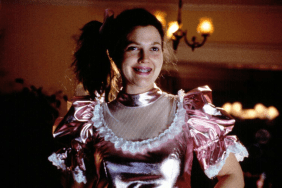The weather was all over the place, from unseasonably high temperatures up to 81 degrees and drizzly rain, but even the advent of the H1N1 virus (commonly referred to as “swine flu”) wasn’t going to keep New Yorkers at home when they had an opportunity to see so many movies before anyone else. Tribeca reported that the 361 screenings of 85 feature length films, panels and talks averaged 95% capacity attendance estimated at 348,000 people, which is slightly lower than the last two years, though there were also significantly fewer movies. Even so, it gives you some idea how much New Yorkers love movies and why the Tribeca Film Festival is so important to them. Most of them had the “luck” of seeing the “Tribeca Film Festival Flasher” a number of times in an intro ad that got a lot of laughs–and even applause at some screenings–but quickly wore on the patience on anyone forced to endure it for more than five or six times. (We think that we caught it upwards of 20 times or more.)
For the most part, the movies that already have distribution tend to stand out at Tribeca, and while the festival has not quite established itself as a market festival in the same vein as Sundance, Toronto or Cannes, one hopes that with time, that can change. Every once in a while, you’ll find something special or a gem that really surprises you, and then you just have to cross your fingers that a good distribution finds them and gives them the attention they deserve.
As far as the best things we saw at the festival, we’ll start from close to the end, because we were lucky enough to score a seat to the high-profile New York premiere of Spike Lee’s Passing Strange at the DGA Theater. Spike filmed the last few performances of singer/songwriter Stew’s personal rock opera during its Broadway run and edited it together in a way that creates an experience completely unique from watching it on stage, Lee’s high-definition digital cameras capturing all the detail up close to the point where you can actually see every bead of sweat on the actors. As a musical, it owes more to Lou Reed’s “Berlin” than it does “Rent” or anything else on Broadway, as it tells the semi-autobiographic tale of a young African-American man who, not feeling at home in South Central, runs off to Europe in hopes of finding himself, losing sight of his roots and the bond with his mother in the process. It features an amazing cast, most of them playing multiple roles, and a hot rock band including Stew’s musical collaborator Heidi Rodewald, who is one bad ass bass-rockin’ chick.
One of the films that we think has the best chance at breaking out from this year’s festival is Raymond DeFelitta’s City Island. It’s the closest Tribeca Film Festival has come to a crowd-pleasing comedy on par with Little Miss Sunshine, and it’s absolutely no surprise that it won the Audience Award this year. It revolves around a dysfunctional family living on City Island, the isolated community off the coast of the Bronx, the head of the household being Vincent Rizzo, a prison guard played by Andy Garcia, who learns that one of his prisoners (played by Steven Strait) is actually his illegitimate son from a previous relationship. Vincent’s dreams of being an actor also brings him closer to a fellow acting student, played by Emily Mortimer, much to the frustration of Vincent’s neglected wife, played by Julianna Margulies. When Vincent takes charge of the prisoner, not telling him that they’re related, he brings him home to help him and keep him out of the trouble, and that’s when sparks start to fly. It’s a great comedy of errors about keeping secrets from your family that really covers a lot of ground. While I’ve never been a fan of Strait, he’s great in this movie by becoming the in for the audience to try to understand this crazy family’s dynamics. It also features a very funny breakout performance by Ezra Miller, as Vincent’s teen son with an affinity for fat women. The movie is just a joyous celebration of life and family, one that the right distributor could certainly turn into a hit just by showing it to a lot of people.

In terms of real horror, you can’t top Ti West’s The House of the Devil, a slow-paced retro-thriller involving a co-ed, played by Jocelin Donahue, who takes a job as a babysitter only to learn that the creepy couple who hired her doesn’t even have a kid. Instead, she finds herself alone in a creepy house in the middle of nowhere, and she starts exploring, and well, let’s just say that the film takes its time building the tension during that first 70 minutes to absolutely explode at the end with a gore-filled ending that should thrill fans of creepy ’70s cult films. It’s one of the best horror movies we’ve seen this year, second only to Sam Raimi’s latest. Sadly, Ti West was pulled from doing any interviews for the movie due to an early interview where he voiced his annoyance with the producer’s shortened version of the film, but even in its abbreviated form, the film was fantastic, the kind of movie horror fans have been dying to see.
We were similarly fascinated by Hysterical Psycho, the directorial debut from Balls of Fury star Dan Fogler, which pokes fun at the commonly-used horror cliché of a group of people left alone in a cabin in the woods only to be slaughtered one-by-one. Fogler’s New York theater group Stage 13 piled into an RV and went up to Maine where they shot the film in a couple days, not so much spoofing the genre as much as playing with those horror stereotypes we all know and love. The funny thing is that they didn’t outwardly spoof the genre as much as make a gory black-and-white horror movie that includes so many moments that would have been played seriously in a ’80s slasher flick, including crazy performances by Randy Baruh and Jeremy Silver, who really steal the movie. Who knows if it’ll get a theatrical release, but it’s a great midnight movie that should be able to find a cult audience. (Our Interview with Fogler.)
Another early surprise was Anders Banke’s Newsmakers, a remake of Johnnie To’s Breaking News, this time set in Moscow where a group of undercover officers take on a group of heavily armored criminals, while an opportunist media person tries to turn their capture into a reality television show. It’s just a great action-comedy that has completely different sensibilities than how similar material might have been handled in America or even from the original movie by To. Lots of great action and explosions but none of it compares to the fiery chemistry between Andrei Merzlikin and Maria Mashkova that builds over the course of the movie to a fantastic ending. We have little doubt that Banke is a filmmaker to watch. (Check out out interview with Banke here.)
Another fun Swedish film was Mans Herngren’s The Swimsuit Issue, a “Full Monty”-like comedy about a group of middle-aged Swedish men who decide to take up synchronized swimming in hopes of competing at the championships in Berlin. Sure, it’s more than a little formulaic, but it’s also the type of fun character-driven comedy that really pulls you along with a diverse group of men dealing with their issues through the unconventional sport.
After a lot of arm-twisting (and having our interest piqued by a color brochure left at the press office), we finally got around to seeing Amir Naderi’s Vegas: Based on a True Story, the story of a family living on the outskirts of Las Vegas who learn there may be a briefcase filled with a million dollars buried in their backyard. Naderi worked with actors Mark Greenwald, Nancy La Scala and newcomer Zach Thomas to create naturalistic performances that really help you believe that this is a family, and the film takes all sorts of interesting twists that sets it apart from the other similar slice-of-life films we’ve seen in recent years. (We spoke with Naderi and the film’s breakout star Nancy La Scala, an interview you can watch here.)

I was equally impressed by Barry Ptolemy’s debut feature doc Transcendent Man, a fascinating portrait of inventor and futurist Ray Kurzweil, his life and theories about the evolution of technology that could be seen in science fiction films like the “Terminator” and “Matrix” films. It’s heady stuff, the type of thing that super-genius computer programmers probably can get their head around but requires a bit more thinking among the non-MENSA crowd, but Ptolemy presents Kurzeil’s ideas in a way that even laymen could understand. It’s one of those docs that really gets you thinking about the part technology plays in your life and how that might someday change so that we’re literally one with our technology. (You can watch an interview we conducted with Ptolemy and Kurzweil here.)
Likewise, Marshall Curry’s Racing Dreams, which won the award for Best Documentary Feature and came in second for the audience award, was a fascinating portrait of three young people–13-year-old Brandon, 12-year-old Josh and 11-year Annabeth–all of whom are competing to be the National Go-Kart Champion, despite having obstacles in their way, either financial or domestic family problems. These are really amazing kids with big dreams, well aware that the road to being professional NASCAR drivers like Jeff Gordon and Danica Patrick starts on the go-kart circuit.
As someone who moved to New York City to immerse myself in the underground art and culture present here in the ’70s and ’80s, I was really impressed with Celine Danhier’s Blank City, which takes a look at the New York underground film movement that produced the likes of Jim Jarmusch, Steve Buscemi, Jean-Michel Basquiat and Richard Kern. What’s amazing about the film is how much rare Super-8 footage director Danhier was able to track down, and there’s something extremely timely about the way these filmmakers took a DIY approach to cinema, using their friends as actors with limited or non-existent scripts. I especially dug the chapters on “Cinema of Transgression,” films that used insanely perverse and disturbing visuals, something that we really haven’t seen much of except maybe in the pre-“Halloween” work of Rob Zombie.
We also were impressed by Cropsey from Joshua Zeman and Barbara Brancaccio, a look at an urban legend that permeated New York during the ’80s after the disappearance of a number of kids near an abandoned mental institution on Staten Island, which were pinned to a homeless drifter named Andrew Rand. The film follows his court case as the filmmakers even correspond with Rand in prison in hopes of learning the truth about the disappearances. There are also some interesting ties to Ti West’s House of the Devil in terms of exploring the possibilities of a Satanist cult being involved with the disappearances and a scary scene that would have fit in well with The Blair Witch Project, but it’s mostly an investigative doc that covers the court trial that surrounds the disappearances.

A few other lesser docs that were still quite good included Gabriel Noble’s P-Star Rising, which follows the rise of 9-year-old Puerto Rican Priscila “P-Star” Diaz and how her poor single father Jesse tries to manage her career and deal with his own inability to find success in the music biz by living vicariously through his daughter. Beadie Finzi’s Only When I Dance follows two young people, coming out of poverty in the slums of Brazil, yet trying to follow their dreams to become ballet dancers, despite facing huge adversity.
There was a lot of interest at this year’s festival in Serious Moonlight, the directorial debut by Cheryl Hines based on the last script by the late Adrienne Shelly, who directed Hines in Waitress. It stars Meg Ryan as an executive who learns her husband (Timothy Hutton) is going to leave her and decides to tie him up until he agrees to work things out in their marriage. It plays the humor a bit too wacky and over-the-top at times, but there are some great dramatic moments, especially a monologue by Hutton, and Justin Long is quite good as a burglar who breaks into the home only to discover this plot. (Kristen Bell plays Hutton’s girlfriend.) One probably can expect this to get picked up for distribution although it’s not nearly as accessible or enjoyable as City Island.
Unfortunately, Michael (L.I.E.) Cuesta’s Tell Tale just didn’t deliver on the original Edgar Allan Poe source material or his earlier work, instead being a rather high concept crime thriller which had Josh Lucas as a single father who undergoes a heart transplant, then starts experiences visions that has him going after the men responsible for the death of his donor. Not handled nearly as well as 21 Grams, the film looked slick, but it was so convoluted with plot developments, including his daughter having a rare genetic disease, that it was nearly unwatchable. That said, it’s the kind of movie that probably could do well if released by a Screen Gems or Fox, who would be able to make it look better with a decent trailer, but it’s more likely a movie we’ll see on DVD before it gets into theaters. (Even so, we spoke to Cuesta and Lucas, an interview you can watch here.)
I wasn’t very impressed either with About Elly or Here and There, two of the festival’s award winners, which proved that the festival jury doesn’t always get things right when compared to Tribeca audiences who made fine choices in City Island and Racing Dreams.

Darko Lungolove’s Here and There won for Best New York Narrative, which was just as surprising to us, since we found most of it to be dull and amateurish at best. It stars David Thornton as a cranky New York musician who agrees to help a Serbian mover bring his girfriend to New York from Serbia, so he travels over there and various things happen that throws their plans off track, but it’s generally, not a very well realized, written or acted film.
In fact, I wasn’t too crazy about Bradley Rust Gray’s The Exploding Girl either, and that won an award for actress Zoe Kazan. Some may remember her as the secretary who had an affair with Leo DiCaprio in Sam Mendes’ Revolutionary Road, but this is more like one of those slice-of-life films that Gray and his wife So Young Kim (Treeless Mountain) do so often, essentially dealing with the platonic relationship between Kazan and her childhood friend.
The Danish thriller Fear Me Not from Kristian Levring (The King is Alive) was also somewhat disappointing. It involves a family man who takes part in a program to test out an experimental antidepressant, and continues to do so even after he learns that it has a side effect that causes rage and erratic behavior. He starts experiencing some of those side effects, which becomes incredibly traumatic on his family. It’s a generally decent premise but the movie never gets nearly as dark as one might expect, especially if you’re expecting something on par with Michael Haneke’s Funny Games. Instead, it turns into a family drama with lots of yelling and fighting but the decent premise never gets dark as we hoped it would.
We couldn’t even get through Daniel Benmayor’s Paintball, which reminded us eerily of the “Stone Cold” Steve Austin bomb The Condemned and it was just as bad. We also couldn’t get through Andrew Lancaster’s Accidents Happen, which might have one of the best opening scenes of any movies we saw at the festival, but then quickly falters as it seems more concerned with delivering stylish cinematography than having a solid script or performances. Geena Davis isn’t bad in it, but she plays a character who is fairly loathsome, and it’s one of those dark comedies that’s really hard to enjoy.
Same can be said for the Polish Brothers’ Stay Cool, an abysmal attempt at a “return to high school” comedy by the prolific indie filmmakers, which comes across as a narrative version of VH-1’s “I Love the ’80s.” Mark Polish just doesn’t have the charisma to carry a romantic comedy like this, having less personality than Matthew Fox, and we’ve seen so many bad films starring Winona Ryder in recent years and just as many starring Hillary Duff, that having them both appear in the same film is just asking for trouble.
The worst movie oddly enough was Fox Searchlight’s My Life in Ruins, featuring the return of Nia Vardalos from My Big Fat Greek Wedding, which closed the festival, and it was simply one of the most gruelingly formulaic and unfunny romantic comedies we’ve seen in some time. If it wasn’t embarrassing enough for the promising actress, it had Richard Dreyfuss sh*tting on what’s left of his career.

We had a chance to see Woody Allen’s latest movie Whatever Works (Sony Classics) at ShoWest before it kicked off the Tribeca Film Festival, and while we couldn’t properly review it, we were thrilled to see Allen returning to New York City, especially with Larry David in the leading role as misanthropic intellectual Boris Yelnakov who brings a young, naïve Southern girl (Evan Rachel Wood) into his home and somehow, the two of them find enough common ground to get married. What’s funny is that the script apparently is one Allen had sitting around since the ’70s, which might be why it seems like a definite return to form, and David does a great job creating an amalgam of his and Allen’s sensibilities playing the role and Wood is quite funny, as is Patricia Clarkson and Ed Begley Jr. as her parents, who show up in New York City only to be corrupted themselves.
We were equally impressed by Priscilla, Queen of the Desert creators Stephan Elliot and Sheridan Jobbins’ adaptation of Noel Coward’s play Easy Virtue (Sony Classics) featuring an amazing ensemble cast including Jessica Biel, Ben Barnes (“Prince Caspian”), Colin Firth and Kristin Scott Thomas. It opens next week, and we’ll have interviews with the makers of the film, but you can read an interview with Barnes right here.
Seeing a sneak preview of Steven Soderbergh’s The Girlfriend Experience was one of the highlights of the Sundance Film Festival this year, but Soderbergh officially premiered the New York based story of a high-priced escort at Tribeca this year. Duncan Jones’ Moon also received a very warm reception at Tribeca after its own Sundance debut, and going by the buzz the film has been creating on the internet, one can certainly see it doing very well in its platform release in New York and L.A. on June 12. We also continue to be fans of two other movies picked up at Sundance, Armando Iannucci’s political Brit-com In the Loop (IFC) and Scott Sanders’ ’70s blaxploitation homage Black Dynamite (Destination Films), both of which we’ll cover more fully when they’re released later this year.
Lastly, as far as the docs that already have distribution, Kirby Dick’s Outrage which opened in select cities last weekend, really got us thinking about hypocrisy within the political system. (You can read our interview with Kirby Dick here.)
Of the movies we really wanted to see but sadly couldn’t fit them into our schedule, we heard great things about Jac Schaeffer’s romantic comedy TiMER, starring Emma Caulfield (“Buffy the Vampire Slayer”), Burning Down the House: The Story of CBGB, a doc about the venerable punk club from Mandy Stein, and the Quentin Crisp dramedy An Englishman in New York, starring John Hurt.
That’s it for our coverage of Tribeca 2009 and you can count on the fact that ComingSoon.net will be back for the 9th festival next year.









